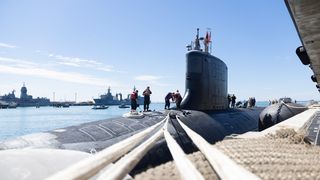Following the Labor Party’s victory in the Australian election, Prime Minister Anthony Albanese is set to negotiate the critical next phase of the AUKUS agreement with US President Donald Trump. A new report from the United States Studies Centre (USSC) at the University of Sydney argues that a proactive approach to AUKUS is needed as much at home as abroad to ensure its success.
In Rising to the challenge: Delivering Australia’s nuclear-powered submarine program, authors Non-Resident Fellow Alice Nason and Director of Foreign Policy and Defence Prof. Peter Dean summarise key themes from a Track 1.5 dialogue with senior Australian representatives of government, industry, universities and unions on the delivery pathway for AUKUS.
“While much attention has been paid to how Australia will discuss AUKUS with President Trump, it is clear that there remains a lot of heavy-lifting required here in Australia to ensure we can manage some of the most complex and advanced nuclear-powered submarines in the world,” Prof. Dean said.
Themes that emerged from the discussions with government and industry included the challenges around delivery of a nuclear project, the pathway to building a sovereign workforce and the importance of building confidence in the Australian national community.
“AUKUS is not simply a government commitment or an industry ambition, it is a whole-of-nation effort that will require different sectors to work together closer than they have before to ensure Australia is match fit,” Prof. Dean continued, “If they channel their collective efforts and ambition effectively, this will be a watershed moment for Australia’s security and sovereignty.”
Key recommendations
The following principles emerged from the 1.5 track dialogue and should be at the centre of ongoing government efforts to implement AUKUS:
- Undertake disciplined and detailed forward planning, manifested in early investment, that connects acquisition with execution.
- Develop effective interfaces to streamline government-to-industry interactions and ensure a high level of customer group engagement.
- Share information comprehensively among AUKUS partners to learn best practices and develop collaborative training models.
- Increase the fluidity between industry and government workforces to improve expertise and capacity to work together.
- Substantiate the Australian Government’s assertion that AUKUS is a national endeavour by engaging stakeholders across Australia’s states and territories.
- Make a sovereign strategic case for AUKUS capabilities to the public.
Media enquiries
+61 468 480 165
ussc.media@sydney.edu.au





